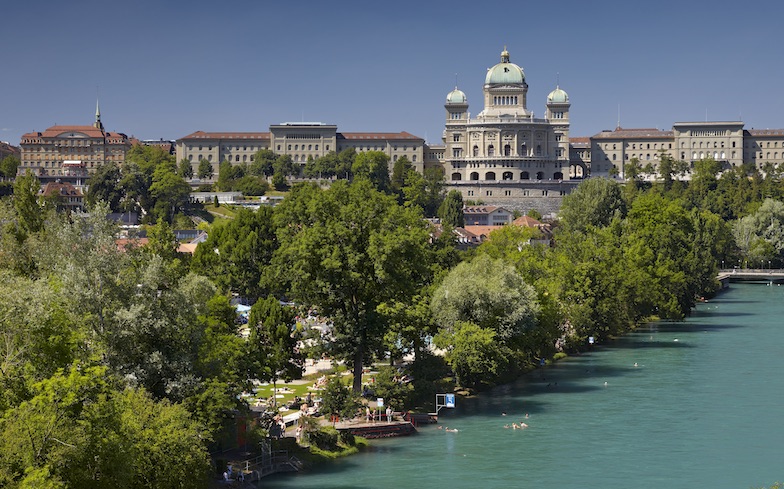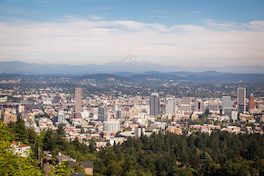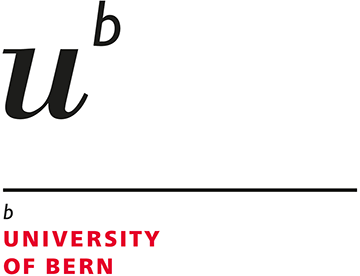Putting smaller capital cities on the map
Some capital cities like London or Tokyo are both political centres and economic powerhouses. But what of those capitals that are not the main economic drivers of their nation, like Bern and Washington DC? They are the focus of The Political Economy of Capital Cities, a book by researchers at the University of Bern.
Author: Morven McLean, International Relations Office

Switzerland is a case in point. If asked to name the Swiss capital, many people would say Zurich or Geneva. For all its charms, Bern - the political capital - is far less well known.
Bern is a classic example of what geographers refer to as a secondary capital city – one that is not the economic motor of its country.
But such secondary capitals are important nonetheless as seats of governments and parliaments. Heike Mayer, a professor of economic geography at the University of Bern and one of the book’s authors, has always had a soft spot for these overlooked capitals.
Unsung heroes
The economic geographer felt it was time to give them the recognition they deserved.
“All along I was interested in places that are not sexy, like New York or Los Angeles, but smaller, secondary cities,” says Mayer.
“The bigger places were studied so much that the secondary cities did not receive much attention despite still being important,” she adds.
Moving to Bern from Washington DC – another secondary capital – in 2009, Mayer discovered the Bernese authorities were holding discussions similar to those in the American capital about the role of federal government in the economy and how to leverage it.
She teamed up with Fritz Sager, a political-scientist colleague, to look at the dynamics driving the economies of the two cities, as well as Ottawa, Canada, and The Hague, the Netherlands, which are similarly positioned.
This research forms the backbone of The Political Economy of Capital Cities, just published by Routledge.

Using case studies, Mayer, Sager and two doctoral students show how each city has utilized its position as a centre of government to forge its own identity as a strong, innovation-driven economy.
Capital presence
But these cities have not put all their eggs in one basket. Thanks to the presence of major teaching hospitals, Bern and Ottawa have both developed important medical research and life-science sectors.
“In all four cities, we find a very focused economy with a substantial number of companies that do business with the government,” says Mayer.
Known as knowledge-intensive business services, these firms specialize in meeting the needs of government, for instance by producing software, conducting studies and evaluations or engaging in public relations and lobbying.
The growing tendency of government departments to outsource contracts benefits these private firms and they tend to cluster around the national government. This, in turn, has a knock-on effect, benefiting the economy of the surrounding region.
While all four cities thrive on the proximity to government, each has its own unique character.
In Washington DC, large government spending on homeland security and defense generates big business for companies, some of which employ tens of thousands of people. And the presence of the Food and Drug Administration, the public health regulator, has acted as a driver for biomedical firms.
For its part, The Hague is home to international organizations but has also specialized in cybersecurity. The city used this strength to develop a cybersecurity delta that brings together the national government, universities and over 1,000 companies.
Political draw
A diversified economy is important, says Professor Mayer, as too great a focus on government could result in a capital being negatively impacted if it downsizes or, as in the recent case of Washington DC, has a shutdown.
The economies of Bern, Ottawa, The Hague and Washington DC continue to grow, producing an interplay of different forces, Mayer says. The cities attract highly qualified people, who then need housing. And universities grow around them because the next generation needs to be educated.
These universities, in turn, attract students, because of the advantages the cities offer, being at the centre of political power and decision-making.
“There are always lots of opportunities for international students in capital cities,” says Mayer.
That certainly applies to Bern.
“If you come to study here, you may get an internship at a federal government agency or go on to Geneva to an international organisation. That’s an aspect we should not forget,” she adds.
13.08.2018
My international journey

Find out more about Heike Mayer's journey to Bern.
